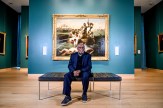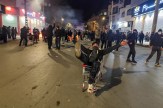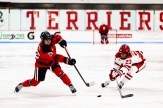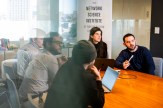Drawing together, illustrating the route to peaceful understanding
Israeli comic cartoonist Uri Fink and Palestinian editorial cartoonist Khalil Abu Arafeh, sat at a table together in the private dining room in International Village Wednesday afternoon, intently drawing caricatures. Of each other.
Fink looked up from the blue rectangle of drawing paper in front of him, where he was shading in an exaggerated version of Khalil’s long nose. “You look more Jewish than I do,” he observed, smiling.
“Ah, but I don’t eat kosher,” said Abu Arafeh with a chuckle.
“That’s okay, neither do I,” Fink replied, laughing now.
It was a small moment near the end of a three-day visit to Northeastern University by members of the international editorial cartoonists group, Cartooning for Peace/Dessins pour la Paix, but it captured the essence of their message: Cartoons, even those that address sensitive political and cultural issues, can break through barriers.
Earlier Wednesday, Fink, a Tel Aviv-based artist who mixes cultural and political cartooning, and Abu Arafeh, the editorial cartoonist for the leading Palestinian newspaper Al-Quds, spoke at a symposium on free expression, responsibility and tolerance held in Blackman Auditorium.
Joining them were Plantu, the renowned editorial cartoonist for Le Monde and cofounder of Cartooning for Peace, and American editorial cartoonists Daryl Cagle, of MSNBC.com; Jeff Danziger, an independent cartoonist with the New York Times syndicate; and Daniel Wasserman, of the Boston Globe.
The six cartoonists were also the featured guests on Monday at a reception hosted by Northeastern President Joseph Aoun to mark the opening of the Cartooning for Peace exhibition in Gallery 360. The display of 86 cartoons created by a cross-section of the group’s members will continue through to May 12.
Opening the symposium, moderator and Northeastern political science professor William F. Miles started by noting, “Cartooning is serious business.” In 2006, caricatures of Muhammad drawn by cartoonists in Denmark and Sweden sparked deadly riots in the Middle East and Africa, the attempted murder of a Danish cartoonist, and the bombing of the Danish embassy in Pakistan.
“However, there is a counteroffensive taking place, quietly but no less remarkable,” said Miles, in the 2007 formation of Cartooning for Peace, which now includes 80 of the world’s leading editorial cartoonists. The organization has held numerous symposia and exhibitions around the world to defend freedom of expression and promote the idea that editorial cartoons that are “respectful in disrespecting,” in Plantu’s phrase, can lead to peace.
Contrasting with the superheated rhetoric and violence surrounding the Israeli-Palestinian conflict, Fink and Abu Arafeh displayed examples of their cartoons that delivered a nuanced viewpoint. In one, Fink depicted Hamas leader Khaled Mashal dressed as Santa Claus with a caricature of a child-sized Jewish settler on his knee, “because Hamas gives the settlement movement in Israel everything they want in political cover to continue building.”
Khalil, who works under the limitations imposed by Israeli censorship and implied pressure from the Palestinian National Authority to censor himself in the other direction, said “I find myself not making a cartoon so much, but an editorial” that seeks to help the “peaceful power of people.”
But even in societies where overt censorship or threats are not an issue, editorial cartoonists need to be aware of the line between freedom and respect for competing values. For example, in response to a question from the audience, Danziger said there are two topics he’s learned to stay away from in his cartoons: sex and race, the latter because “it’s still too close to the surface” in American life.
The symposium was the culminating public Cartooning for Peace event at Northeastern. The week commenced on Monday with Plantu, Fink, Abu Arafeh and Danziger engaging with students in a class, “International Conflict and Negotiation,” as well as similar discussion sessions in culture and visual art classes.
The university collaborated with the French Consulate in Boston and with sponsor Accors Services to make the Cartooning for Peace events possible.





